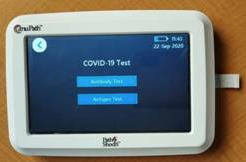IISc-based startup develops semi-quantitative electrochemical ELISA test for COVID-19
May 20, 2021 | Thursday | News
PathShodh has received the license to manufacture the test for sale from the Central Drugs Standard Control Organisation
PathShodh Healthcare, a startup incubated at the Society for Innovation and Development (SID), Indian Institute of Science (IISc), Bengaluru has made a significant breakthrough in developing a first-of-its-kind, semi-quantitative electrochemical ELISA test for COVID-19 IgM and IgG antibodies.
PathShodh has received the license to manufacture the test for sale from the Central Drugs Standard Control Organisation (CDSCO), after due diligence validation at the Translational Health Science and Technology Institute (THSTI), Faridabad, as per the requirements of the Indian Council of Medical Research (ICMR).
The novelty of the technology is based on the measurement of electrochemical redox activity of IgM and IgG antibodies specific to the SARS-CoV-2 Spike Glycoprotein (S1).
The S1 protein has a Receptor Binding Domain (RBD) which latches on to the ACE2 receptors on the host cells before infection. Hence, antibody tests targeting the S1 spike protein are more representative of immune response against infection compared to those that target the Nucleocapsid (N) protein.
PathShodh’s technique, which is protected through US and Indian patent applications, is also a major departure from the qualitative rapid antibody tests in the market, which are primarily based on the lateral flow ELISA technique.
This test has been developed leveraging PathShodh’s Lab-on-Palm platform “anuPath”, which interfaces with disposable test strips functionalized with an immunoreceptor specific to COVID-19 antibodies. The results are automatically displayed by the handheld reader. Hence there are no subjective errors due to manual readout of test results, as in the current lateral flow assay test kits.
The other unique features of this technology include on-board memory to store more than 1 lakh real-time test results, touch screen display, rechargeable battery, Bluetooth connectivity to smartphone and cloud storage, capabilities to map the patient data to Aadhar number and the possibility of connecting test data through APIs to Aarogya Setu.









